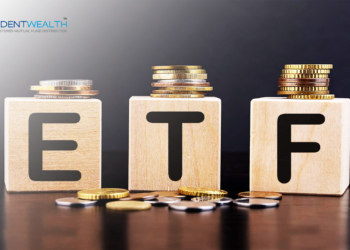
Often people get confused between ETFs and Index Fund; in this article we will discuss ETF vs Index Fund, which one you should consider while investing.
ETF stands for “Exchange-traded Fund”.
An Exchange-traded fund (ETF) is a type of securities that helps to keep track of an index, market, commodity, or other assets. It can be purchased and sold just like any other stock on a stock exchange. An ETF can be established to monitor anything at all from the price of a single product to a broad range of securities. ETFs may also be designed to follow various financial instruments.
ETFs may hold a variety of investments, such as stocks, commodities, shares, or a combination of them. An exchange-traded fund is a marketable commodity which means it has a price that can be bought and sold efficiently.
An Exchange-traded Fund (ETF) is a collection of shares that trade like shares on a share market.
Since it trades on a stock exchange, an ETF is called an Exchange-traded fund. It is made up of shares that represent widely followed indexes such as BSE Sensex and NSE Nifty 50.
If an ETF is following a particular Index, then that index would contain the same stocks and shares like that of the index, and their weightage shall also be the same. Also, the ETF may invest in instruments that belong to the money market for the sake of liquidity.
What is ETF Liquidity?
ETF Liquidity is the simplest way by which a specific ETF (Exchange-traded Fund) can be purchased and sold on the stock exchange.
Since ETFs are essentially asset baskets, the idea of ETF liquidity is multi-layered as well. In general, the more liquid the individual assets that comprise an ETF are, the simpler it is to redeem the ETF as a whole.
ETF Returns:
ETF returns are normally predictable and will be close to what its principal index earns. However, despite many ETFs following the same index, their returns will not be the same as their debt holdings differ, which influences their returns whether positive or negative.
- NOTE: The units of ETFs are traded on stock exchanges, the same as shares.
What are Index Funds?
An index fund is a type of Exchange-traded Fund (ETF) that invests in a portfolio that is designed to replicate or monitor the elements of a financial market index. A passive investing approach is followed by index funds.
A large market exposure, low operating costs, and low surplus production are all claimed benefits of an index mutual fund. Regardless of market conditions, these funds monitor their investment objective.
Index funds are commonly regarded as suitable core portfolio holdings for defined benefits, such as individual retirement savings.
An index fund’s asset allocation attempts to match that of the known index it is attempting to copy or imitate. Since index funds lack liquidity, they place a greater emphasis on liquid securities. As a result, monitoring errors exist in index funds.
The differentiation of the returns that an index fund would earn from the returns that of its underlying index is directly proportional to the tracking errors.
Index funds aim to match the market’s risk and return, on the premise that the market will outperform every single investment over time.
Let’s look at how to invest in ETFs and Index Funds, now that you’ve learned about both.
ETF:
The ETFs’ units can be purchased and sold on the stock exchange, as the name recommends. Hence, if you are willing to invest in ETFs, then you mandatorily require to have a Demat Account.
A minimum of one unit has to be purchased, and this can be done the same way you purchase or sell an ordinary share on a stock exchange through a well-known broker.
Index Fund:
The index funds are ordinary mutual funds. You can invest in a lump sum amount or Systematic Investment Plans (SIPs) to purchase units of index funds.
Demat accounts aren’t mandatory to invest in index funds. Nonetheless, having a Demat account is beneficial in several ways for investors.
When investing, we must compare the costs associated with both investable instruments.
- When it comes to investment in ETF, there are no charges of recurring.
- Alongside the Demat account’s annual maintenance charge, Transaction Charge is just another cost that you as an investor have to bear, which is restricted to be within 5%
- When compared to ETFs, index funds have various charges.
- A transaction fee of Rs.100 is chargeable on transactions above the amount of Rs.10,000.
- Unlike ETFs, the index funds approach with an expense ratio, a charge of recurring in the range of 1% to 1.8%.
- Investors are to pay the amount of expense ratio even if there are no transactions made by them.
- Aside from that, if you are wished to exit the fund within a specified timeframe, then you are accountable to pay the exit load.
- Comparative Analysis: ETV vs. INDEX FUNDS:
|
Parameter |
ETFs |
Index Funds |
|
Objective |
Following the performance of leads of a particular exchange. |
Replicating the performance of a given index. |
|
How are they traded? |
Traded like a stock on an exchange. |
Index Funds’ units are declared like another mutual fund. |
|
Pricing |
The pricing follows the principle of shares. |
The fund’s NAV differs because of various factors. |
|
Factors affecting the price |
The security’s demand and supply in the market. |
The Fund’s NAV and the underlying assets. |
|
Cost |
A transactional fee is applicable. |
No transactional fee and commission. |
|
Expense ratio |
Low |
High |
Conclusion:
ETFs might seem to have a complete benefit over Index Funds as they come at a less cost. Although, you may not be in a situation to follow or track markets and take decisions accordingly. This may be caused by a lack of market knowledge or time restriction. In this scenario, you can invest in direct Index Funds as they approach at a lower cost than regular or ordinary Index Funds. Also, these funds (Index Funds) are handled by professional fund managers, and they take accurate decisions depending on the market scenario.
Read Next: “What is Load in a Mutual Fund?”
For more information, reach us at [email protected]
Team, MyGoalMySip.











